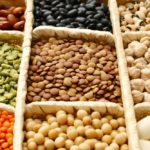
Comment/Feedback
Opinion: Food policies should support small-scale producers
Ramping up food production via large-scale farming operations alone is unlikely to eradicate world hunger
Health Canada’s suggested new food labelling has limitations
The labels would help consumers know what’s in their food but there are some gaps in the system

Opinion: Pulses and the future of food
India’s decision to impose tariffs to support its farmers is creating dangerous uncertainty
Canada’s new and growing market: Nigeria
This African nation has a young and growing population, making it an ever more important buyer

Food policy recommendations reflect diverse interests
The report to Parliament will either cement the solitudes or set the stage for finding common ground

Comment: A method to its madness
There’s more to Richardson’s canola council withdrawal than meets the eye

Comment: Have your say on commodity groups
TPP II: Hedging against NAFTA, and America
The deal looks good for most farms but supply management will likely suffer and should plan for the future

Comment: Time to tax meat?
Many think so but they’re advocating for this measure from an ideologically driven perspective

Is the future of NAFTA truly bleak?
By understanding that free trade agreements benefit consumers, businesses and governments, this deal can be saved


